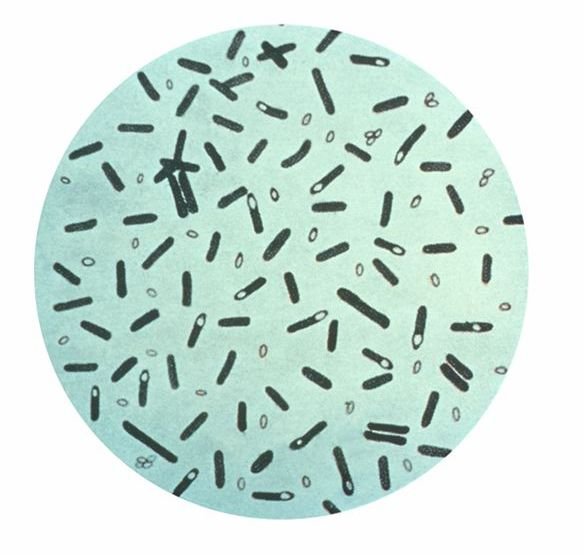Diseases Caused by Bacteria: How Harmful Bacteria Make You Sick
Harmful Bacteria
Certain species of bacteria are harmful to humans because they produce metabolic by-products (toxins) that are poisonous to body cells. For example, some toxins can disrupt the normal activities of nerve cells, and others can prevent the translation of messenger RNA (mRNA) into protein.
Diphtheria: Disease Caused by Bacteria Corynebacterium diphtheriae
Diphtheria is a bacterial infection of the upper respiratory system usually affecting children. The aerobic gram positive bacterium Corynebacterium diphtheriae attaches to the mucus membrane of the throat where it multiplies and eventually causes inflammation. An individual with diphtheria initially experiences sore throat, fever, swollen glands, and fatigue. If not treated with antibiotics, the bacteria will spread through the bloodstream until they reach other body systems. The bacteria produce a powerful toxin that inhibits the translation process in almost all types of body cells; metabolically important proteins are not produced as a consequence. The toxin is an A-B type of exotoxin. The A is the active part (an enzyme) that interferes with translation while the B is the part that attaches A to the surface of host cells.
Diphtheria may cause the formation of a tough gray membrane in the larynx which can block the entrance of oxygen leading to suffocation. Damage of the heart, the kidneys, and the nervous systems characterize diphtheria in the advanced stage. When the heart tissue is damaged, heart failure may occur leading to death. If the toxin destroys the protective myelin sheaths of neurons, it can result in the loss of muscle control and loss of sensation, and eventually lead to paralysis.
Erythromycin and procaine penicillin G are used to treat diphtheria patients. Prevention of diphtheria involves vaccination.
Botulism: Disease Caused by Bacteria Clostridium botulinum
Botulism is a serious disease caused by the gram-positive bacterium Clostridium botulinum. There are three types of botulism - food borne (food containing the bacterium) infant (consuming bacterial spores), and wound (wounds infected by the bacterium). The bacterium is hard to kill because it produces endospores that can survive extreme temperatures. Botulism is fatal if not treated early with antitoxin.
C. botulinum produces an A-B neurotoxin with a molecular structure similar to diphtheria toxin - with A & B polypeptide subunits. The neurotoxin blocks the transmission of impulses between nerve and muscle cells at the neuromuscular junction. When the A subunit of the toxin enter the nerve cell, it prevents the release of the neurotransmitter acetylcholine. If acetylcholine is not released from the nerve, no contraction will occur in the muscle, and this leads to paralysis.
Paralysis of minor muscles of the body may not be fatal, but the paralysis of the respiratory muscles could lead to suffocation and eventually death. The degree of paralysis that a patient will experience depends on the quantity of neurotoxin present inside his or her body.
Tetanus: Disease Caused by Bacteria Clostridium tetani
Tetanus is a serious infection caused by the bacterium C. tetani that enters the body through the wounds of an injury. Patients with deep wounds are highly susceptible to tetanus infection because the anaerobic nature of the deep portions of the wounds favors the rapid growth of the bacterium.
Like C. botulinum, C. tetani produces a neurotoxin - it’s called tetanospasmin but it has a different mode of action. If the botulinum toxin inhibits the muscle contraction pathway, tetanus toxin prevents the relaxation pathway of muscles. In the normal operation of a muscle, two opposing muscles receive two different signals: one receiving the impulse to contract and the other to relax. What the tetanus toxin does is block the transmission of the impulse telling one of the opposing muscles to relax. The two opposing muscles then contract steadily resulting in muscle spasms. Muscle spasms that occur in the muscles of the back could result in a fractured spine. Spasm of the respiratory muscles is very dangerous because it could lead to suffocation and eventually death.
Tetanus can be prevented by vaccination, and the harmful effects of this bacteria can be treated with drugs and muscle relaxants.
Source:
Tortora GJ, Funke BR, and CL Case. 2005. Microbiology: An Introduction. Pearson Education Asia.
